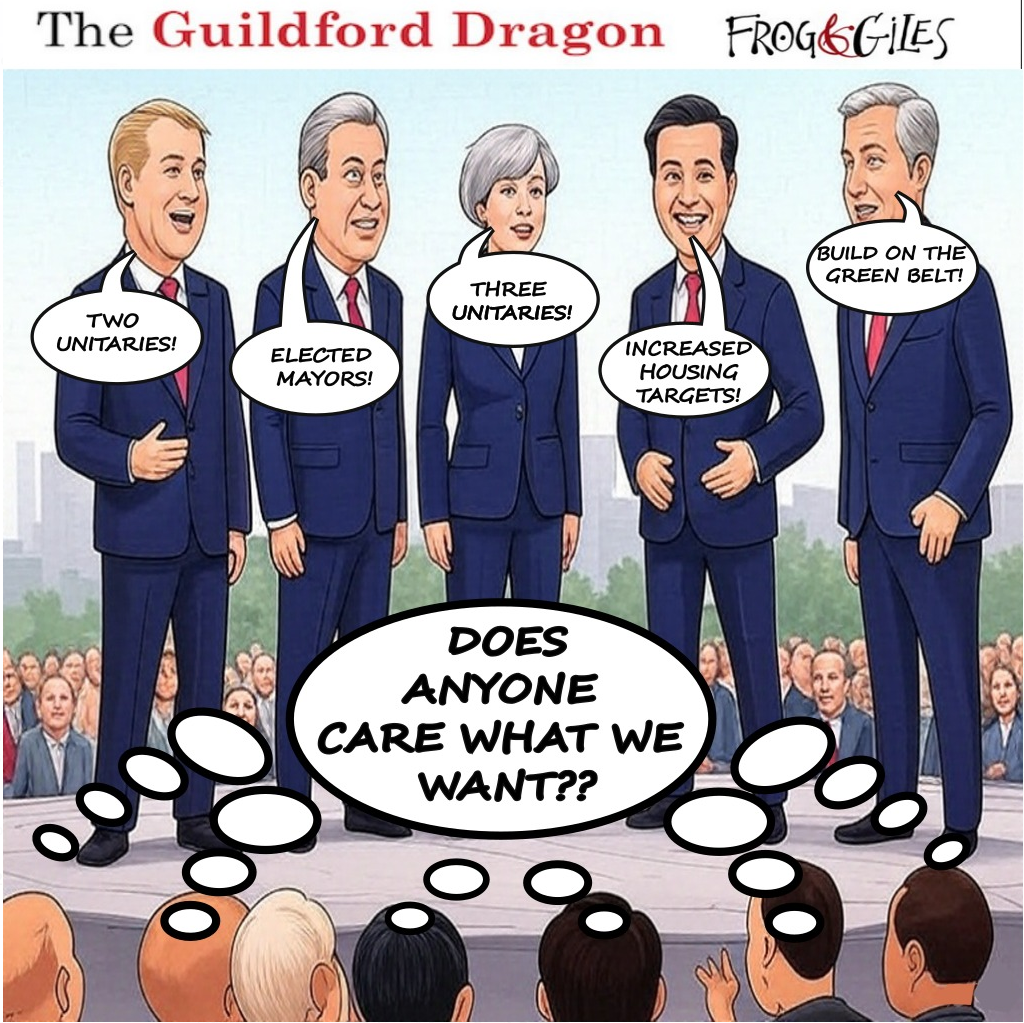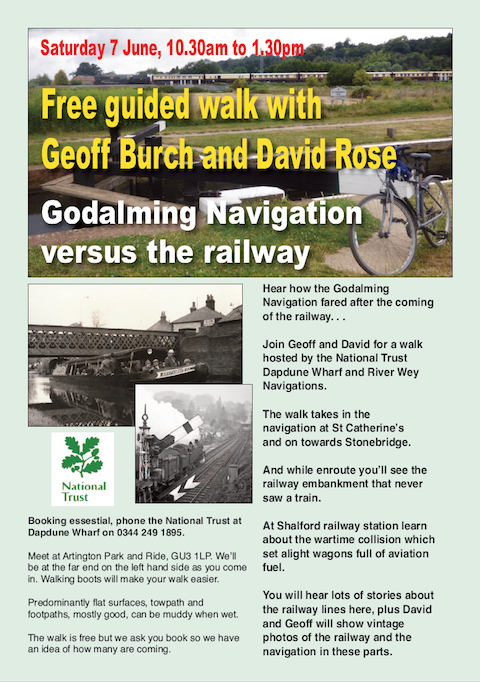- Sunday, June 01, 2025
- Stay Connected
 Abraham Lincoln
If given the truth, the people can be depended upon to meet any national crisis...
Abraham Lincoln
If given the truth, the people can be depended upon to meet any national crisis...
 Guildford news...
for Guildford people, brought to you by Guildford reporters - Guildford's own news service
Guildford news...
for Guildford people, brought to you by Guildford reporters - Guildford's own news service
Opinion: What Makes Your Blood Boil?
Published on: 30 Mar, 2015
Updated on: 1 Apr, 2015
With a general election looming it is understandable that the big issues are dominating the media. Should we: continue economic “austerity”, leave the EU, or discontinue Trident? Questions that are sufficient to take up all the time you might have to give to politics while living busy lives.
Of course, when it comes to the election, we cannot pick and choose between the different policies on offer. We have one vote to cast for a single candidate. Nearly all will belong to a party whose policies they will be expected to support lock, stock and barrel.
But if you are like me, even if you appreciate how lucky most of us are when compared with many others in the world, you have a number of bug bears, perhaps lower profile, smaller things you wish politicians of any party would fix. Some of them wouldn’t, you might imagine, cost that much, if anything, and some could surely give much kudos to whoever put them right.
 What really irritates you? What problems make you say: “Can’t the government or the council even fix that!”
What really irritates you? What problems make you say: “Can’t the government or the council even fix that!”
Here, off the top of my head, is my list. None of these would, I believe, have a significant cost.
Cold calls
You are in the middle of a meal and the phone goes. You don’t like to let it ring because it could be important news you are expecting. You rush to the phone, pick up the receiver to hear in a voice that makes you suspect the call is coming from outside the UK, “Mr Guyles [or insert your mispronounced name here], how are you today [I was fine]? Our records show that you were involved in an accident…”
You might feel like you would like to involve the caller in an “accident” but instead you just say: “No thank you,” and hang up, muttering expletives.
Registering with the Telephone Preference Service is only partially effective. Calls originating abroad are hard for them to control.
I swear if any politician could faithfully promise to put an end to such calls, and then deliver a solution, I would be sorely tempted to vote for them for life.
(By the way, I would also like to bar calls from callers who do not wish to reveal their number. Why should I be disturbed by calls from those who do not want me to know who they are?).
Better enforcement of speed limits in residential areas
Speeding is a chronic problem on many residential roads but the police seem reluctant to take effective measures. Of course, police resources are evermore constrained and speed cameras although effective, ugly and unpopular. But because they are effective perhaps wider use should be reconsidered, especially if any fines could be exclusively used for road maintenance.
Bargate wall repointing
Bargate stone is one of the original local building materials. This attractive honey toned sandstone can be seen in many roadside walls, built in the Victorian period, by roads to the south of Guildford. Many are now in desperate need of re-pointing. This is normally the responsibility of private landowners, but unless the council acts soon some walls will collapse on to pavements and roads with all the commensurate risk and inconvenience. As the old saying goes: “A stitch in time…”
Tougher community service
Sentencing of criminals can often seem odd. A burglar gets community service and someone who has committed perjury is sentenced to prison. Both are serious offences and both deserve punishment, but in terms of threat to the public isn’t the burglar a greater threat?
In any case, how do we make community service a more effective punishment, a greater deterrent and more beneficial to the community and the offender? I think it needs to be challenging, and have a degree of difficulty, physical effort, even unpleasantness. (Perhaps a few hours a day filling in those potholes or re-pointing?) It should also be apparent that culprits are being punished so that the rest of us think twice before committing crime. If that makes the culprits feel ashamed then good. If they co-operate they could be taught useful skills that will enhance employment prospects.
Successful and effective community service could mean that there is less family breakdown and disruption to any regular employment. It would also be much cheaper for the taxpayer. Our limited prison spaces (the prison population in England and Wales currently stands at over 85,000, more than double the figure it was in 1993) could be reserved for those from whom we require protection and recidivists for whom other punishments have not worked.
Cheaper bus fares
Some people seem to look down on public transport, especially buses. They seem to feel it is only for those who cannot afford cars. Of course this is ridiculous. As our roads get busier we should encourage the use of buses more and more. It benefits all of us.
An idea I put forward previously, to use congestion charging to subsidise further more frequent/cheaper bus services was unpopular, mainly, perhaps, because it was not understood that I was not suggesting it should be payable by those who live in the borough. Anyway, I maintain that while the options to fix traffic congestion are limited the idea should be considered.
Bike routes.
The advantages of bike travel are well known, it is healthy and reduces the number of cars on the road, but the network of bike lanes in Guildford is lamentable. Try, for instance, cycling to the railway station, from any direction, without negotiating busy car and lorry dominated roads. We need some fresh thinking on the problem. Our local councillors have let us down on this year after year.
Tax deductible care fees
Recently my mother had to spend some time in a residential care home. Because she has worked hard and built up some assets she did not qualify for any help with the £1,000-a-week fees. She has always paid her fair share of tax and continues to do so on her moderate income. Surely such individuals, pensioners who have truly done their bit, be able at least have their care fees made tax deductible.
Proportional representation
With the election results at both national and local level so unpredictable who knows what the make up of our government and council will be? One thing is for certain the MPs and councillors elected will not reflect the percentage vote each party gets. The cockamamie “first past the post” system is surely past its sell by date. It might have been acceptable when two parties truly dominated but that has not been the case for some years. A system that leaves so many voters poorly represented must be changed if democracy is to be served.
Outlaw whipping
Another change to our political system should be the outlawing of party “whipping”, formal or informal. MPs and councillors should feel free to vote in whichever they want to best represent their constituents, the interests of their party should be very much a secondary concern. If a majority of MPs or councillors, voting freely, do not support a motion it does not deserve to succeed.
Routine vote recording at GBC
Coming right home to Guildford Borough Council every vote should be recorded so that we can all see how our representatives voted on any motion, in the same way we can see how MPs vote. Why this is not already in effect when our council chamber has been equipped, at taxpayers’ expense, to do this electronically defeats me. Other councils already do this and we should too. What possible reason can there be for not doing so?
Pot holes
This is an old chestnut, of course, but why is it that road maintenance is such a challenge to Surrey County Council? Is it just a question of money? If so, why does it seem worse in some counties than others? The hope that existed when a new contractor was appointed, in 2011, seems to have largely evaporated now that May Gurney has been taken over by Kier Group. Some roads in Guildford, including main roads such as Woodbridge Road, are simply a disgrace and recompense for damage caused to cars by potholes can be an expense we all have to bear through our taxes.
Litter
This might be a perennial and incurable problem but some countries do seem better at it than we are. Of course it is a cultural problem. Some seem to feel no shame in dropping litter. Perhaps we need to be better at identifying culprits and think of more suitable and effective punishment than a fine. Some hours picking litter under supervision wearing a tabard with the words: “I am a litter bug,” might work.
Of course, it is a truism that we get the politicians we deserve. We vote for them, or, at a local level, most of us don’t even bother to vote for them. So if you are tired of the status quo vote for someone new or demand that the existing politicians pay more attention to the expressed views of their constituents.
What do you think? Do you agree with the ideas put forward? Do you think some are baloney? You might have other ideas of your own? Please use the “Leave a Reply” feature below to join in the debate.

















Bernard Parke
March 30, 2015 at 9:42 pm
Local councillors should be completely free to serve the needs of the people who elected them and not take “the whip” from an executive (or cabinet).
Many members of this elite band here in Guildford live many miles from the town centre.
The answer surely must be for more independent councillors who live in these local areas and know at first hand of our local problems.
Frankly, we need more independent people to come forward as borough councillors.
Such people who do not have a duty or who are sponsored by national parties.
Indeed, many of whom without such sponsorship would never become councillors at all if left to their own abilities.
Ngaire Wadman
March 30, 2015 at 10:20 pm
Absolutely bang-on correct on all points, especially the abandonment of party politics at local level.
I am appalled at the tribalism rampant at Millmead – for goodness’ sake, councillors are there to work for the good of the people of Guildford, not to emulate the bear-pit of Parliament! (UKIP does not, and never will, impose party policies on its councillors or MPs).
Returning the council to full assembly voting would be a good start, getting rid of that far-too-cosy Executive and leader structure.
As for community service, tabards and litter-picking come to mind as just punishment for crimes committed. If you can’t face the time, don’t do the crime?
Paul Spooner
April 1, 2015 at 12:18 pm
There is no party ‘whip’ within the majority Conservative group at GBC.
I have no idea why Alderman Parke should think so, unless that was the case in the past when he was a councillor!
Indeed, observers can see that individual members have different points of view at meetings and there is not a ‘party’ position imposed by the leader, the Executive or anyone else.
I am pleased to see that Ngaire Wadman is stating that UKIP are following the Conservative position in Guildford.
Ngaire Wadman
April 4, 2015 at 12:02 am
Au contraire, nice to see the Tories continuing their fine tradition of copying UKIP policies and principles.
So GBC Tory councillors are not whipped? They do not just follow their leader? They are not even slightly tribally inclined?
Yeah, right.
Gordon Bridger
April 1, 2015 at 5:10 pm
Well done Martin – many well thought-out issues which very few of us could object to.
But what about the really controversial ones?
How do we achieve the economic growth we need in Britain to fund our balance of trade deficit? Or is there a way to control huge salaries and bonuses paid to bankers and executives paid by unwitting shareholders and tax payers, and should we control welfare benefits?
More relevant to Guildford, how are schools, public services which need more young professionals who are key to our economic future to be staffed when we make house prices impossibly high by land use restrictions?
How does one balance sanctuaries for birds and plants against the need for homes?
Can we allow say 1% of green belt to be developed over the next 15 years to provide for more homes?
Do we need more shops or more houses? How do we solve our traffic problems? Should we encourage university expansion?
You might select some of the most controversial and seek readers’ views.
For example, how important is economic growth to Guildford? Do we need more retail development? Should we allow modest redrawing of poorer quality green belt land for homes?
John Robson
April 2, 2015 at 4:38 pm
Aaaah, the old “1% of the green belt”, say it enough times and they’ll believe it, chestnut.
If we add up all of the little, insignificant “1%’s” that councils are using as the nationwide justification for not tackling the problematical brownfield sites first, or attempting to unlock the masses of land banks that have been stockpiled, how much of England’s 13% green belt will be left? And from a local perspective, how many of England’s 33 AONBs will remain?
And as per Vince Cable’s edict, If you require some virgin, untainted green land in which to build your affordable homes, “build homes on Surrey’s golf courses”, don’t take from the amenities of the working classes, take it from the elite.
Green belt is green belt isn’t it, it was designated as such for a purpose wasn’t it? And if the reasons why it was designated as green belt existed where valid at its inception, surely in these days of rampant, uncontrolled population growth the reasons for preserving the green belt are even more valid today than they ever were.
Finally, If the gridlocked town centre is to resemble a university dormitory, with respect Mr Bridger, surely you will allow us Guildford’s green fields in which to breathe.
Jules Cranwell
April 2, 2015 at 11:01 pm
John Robson is a top man. I could not have put it better – and I’ve had a modicum of practice in these matters.
Jules Cranwell
April 1, 2015 at 8:56 pm
Spot on on the points made. However my bugbear is the complete abandonment of the green belt by the incumbent Tory executive, as outlined in their daft local plan.
Our green belt is, above all things, what makes our borough so great.
Bernard Parke
April 2, 2015 at 10:12 am
I am delighted to learn that there is no pressure on today’s councillors to follow a party line and are free to express their electorates’ views which is of course the bench mark of the independent councillor.
However, there could be a conflict of interest between national policy and local interests, especially when it affects the quality of their lives.
Peta Malthouse
April 2, 2015 at 2:30 pm
Gordon Bridger is wrong when he suggests that the housing crisis is due to ‘land restrictions.
It is far more complicated than that. If there were none it would lead to total abandonment of planning law which was designed to make the best use of our sadly limited land resource in this country.
Planning should allow government to look at development of the regions and come up with policies to attract business to areas where they can benefit from good infrastructure.
Devolution to regional government is what is needed so that the people who know their resources best can plan to use them more effectively.
lifting so called land restriction in Surrey will only serve to house more of those from London who wish to cash in on the ridiculous house prices caused by allowing land to be sold to non-resident foreigners as a mere investment (Russia, China, Malaya, etc).
There is even speculation going on in the green belt in Surrey with agricultural land being advertised to foreign investors.
While these pressures are allowed to remain young people will never be able to house themselves in the numbers my generation achieved.
If you want to help young people it will be by giving them tax breaks or building low-cost housing allocated by reference to their strength of connection with the area.
Old-fashioned remedies such as ‘shared ownership’ low cost’ and key worker’ housing will have to be revisited.
Surrey is stuck as a commuter belt county housing those who work in London. That is where the problems start. An over emphasis on the capital as the means of economic recovery.
The fight over the green belt is key because we are the most populated county outside of London and using green belt land for anything other than ‘exceptional circumstances’ should not even be contemplated.
It doesn’t have the infrastructure, drainage, sewerage, roads, shops and services because it is green belt.
Furthermore, it is designated green belt in order to ensure that those who live in built-up areas can get reasonably good access to it .
It does not just look pretty, it serves a number of vital purposes. Once removed from protection you cannot return it to its original purpose.
Lisa Wright
April 4, 2015 at 9:30 pm
Green fields = clean air
Overdevelopment = smog
What would you prefer?
Lisa Wright is the Guildford Greenbelt Group candidate for Normandy ward.
Neville Bryan
April 6, 2015 at 3:24 pm
I found interesting a comment out of a recent televised debate between amoungst others CPRE [Campaign for the Protection of Rural England], and Housing Charity Crisis UK.
The phrase which caught my eye was along the lines, “We have stopped seeing housing as a place to live but rather as an investment.”
Perhaps if national parties would tax second houses like an investment, especially “buy to leave”, but also other types of housing speculation, and investment for investments sake, just perhaps over development and house prices might stabilise a bit.
Until that type of strategic government decision is made and executed, there are two many people with vested interests in inflated house prices – starting with Developers and land owning councils.